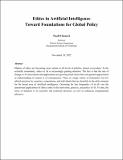| dc.contributor.author | Choucri, Nazli | en_US |
| dc.date.accessioned | 2022-12-21T08:03:57Z | |
| dc.date.available | 2022-12-21T08:03:57Z | |
| dc.date.issued | 2022-12-21 | |
| dc.identifier.uri | https://hdl.handle.net/1721.1/146915 | |
| dc.description.abstract | Matters of ethics are becoming more salient at all levels of politics, almost everywhere. In the scientific community, ethics in AI is increasingly gaining attention. The fact is that the rate of change in AI innovations and applications are growing much faster than our general appreciation or understanding of content or of consequences. There is a large variety of statements, but few ethical practices by countries, corporations, and individuals that are desirable in the ethics domain for the broad area of Artificial intelligence. Occurring far less frequently—if at all—are the operational applications of ethics codes in the innovation, practice, and policy of AI. To date, the focus of attention is on scientific and technical advances, as well as enhanced computational advances. | en_US |
| dc.description.sponsorship | This material is based on work supported by the U.S. Department of Defense for National Security Agency, Science of Security & Privacy Program under Grant No. H98230-18-D-00-0010. Any opinions, findings, conclusions or recommendations therein are those of the author(s) and do not necessarily reflect the views of the US Department of Defense. | en_US |
| dc.language.iso | en_US | en_US |
| dc.publisher | © MIT Political Science Department | en_US |
| dc.rights | Attribution-NonCommercial-NoDerivs 3.0 United States | * |
| dc.rights.uri | http://creativecommons.org/licenses/by-nc-nd/3.0/us/ | * |
| dc.subject | Ethics | en_US |
| dc.subject | Artificial Intelligence | en_US |
| dc.subject | Global Policy | en_US |
| dc.title | Ethics in Artificial Intelligence: Toward Foundations for Global Policy | en_US |
| dc.type | Working Paper | en_US |
